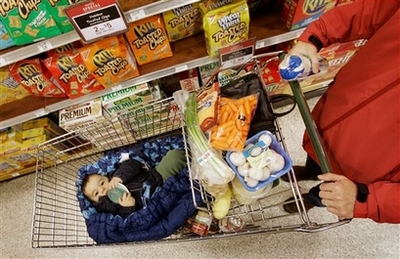Food price inflation changes how Americans shop
(Agencies)
Updated: 2008-04-01 10:32
Updated: 2008-04-01 10:32
Steadily rising food costs aren't just causing grocery shoppers to do a double-take at the checkout line -- they're also changing the very ways Americans feed their families.
The worst case of food inflation in nearly 20 years has more Americans giving up restaurant meals to eat at home. They are buying fewer luxury food items, eating more leftovers and buying more store brands instead of name-brand items.
|
|
For Peggy and David Valdez of Houston, feeding their family of four means scouring grocer ads for the best prices, taking fewer trips as a way to save gas and simply buying less food, period.
"We do more selecting, looking around, seeing which prices are cheaper," said David Valdez. "We are being more selective. We have got to find the cheapest price."
Record-high energy, corn and wheat prices in the past year have led to sticker shock in the grocery aisles. At $1.32, the average price of a loaf of bread has increased 32 percent since January 2005. In the last year alone, the average price of carton of eggs has increased almost 50 percent.
Ground beef, milk, chicken, apples, tomatoes, lettuce, coffee and orange juice are among the staples that cost more these days, according to the federal Bureau of Labor Statistics.
Overall, food prices rose nearly 5 percent in 2007, according to the US Department of Agriculture. That means a pound of coffee, on average, cost 57 cents more at year's end than in 2006. A 12-ounce can of frozen, concentrated orange juice now averages $2.53 -- a 67-cent increase in just two years.
And a carton of grade A, large eggs will set you back $2.17. That's an increase of nearly $1 since February, 2006.
"The economy is having a definite impact on shopper behavior," said Tim Hammonds, president and chief executive officer of the Food Marketing Institute, a retail trade group. "People are significantly changing what they do."
Soaring prices are causing shoppers to rethink long-held habits such as store loyalty.
|
||
|
||
|
|
|
|


